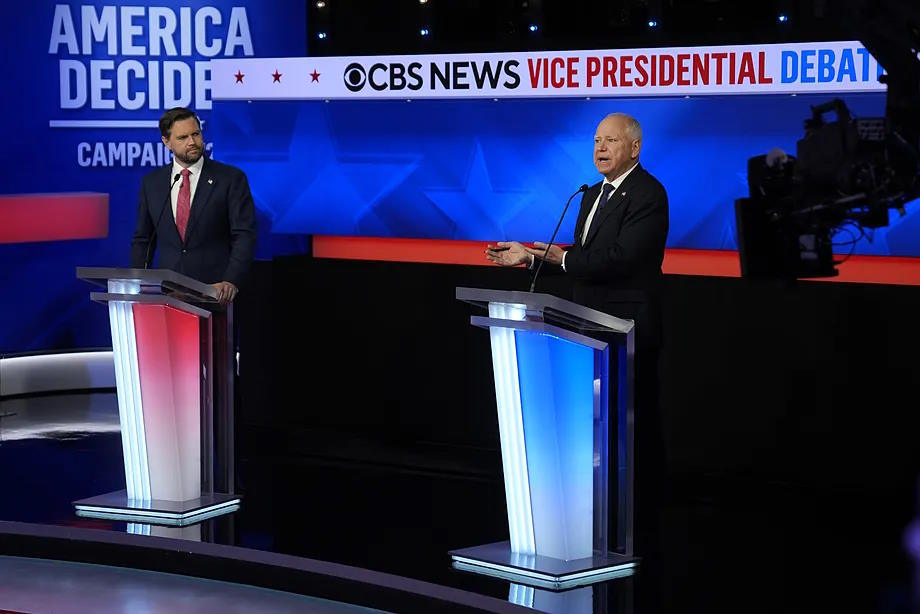The missile attack launched on Monday from Iran against Israel "will have consequences." However, what these consequences will be, and who should choose or agree on them, is not so clear. That was the conclusion of the debate held on Monday by J.D. Vance, Senator from Ohio, and Tim Walz, Governor of Minnesota, the vice presidential candidates of the United States. A rather dull debate, not particularly aggressive or deep, which covered many national issues but started, as expected, with images of Tel Aviv's missile defense systems, funded over the years by U.S. aid.
The Democrat, following the lines set by Vice President Kamala Harris, stated in his first intervention that Israel has every right to defend itself after the attacks on October 7 and the attacks by Iran or its proxies, such as Hezbollah, but did not directly answer the moderators' question, who wanted to know if his government would support a "preventive" attack by Israel to end Tehran's nuclear program. The Republican, on the other hand, took a stand, after an initial digression, saying that the decision to attack or not (as Israel has done at different levels in the past) depends on Israel if "it feels necessary," but that he would have his support and that of a Trump-led government because the U.S. must "support its allies against the bad guys."
Foreign policy rarely has a presence, and even less influence, in U.S. election campaigns, but the issue of the Middle East, specifically Israel, is a different story. To a large extent, it is not an international issue, but a domestic one. Every candidate, regardless of party or position, must have a very clear, unequivocal stance. And in 95% of cases, this means unwavering alignment (with nuances depending on the case) with Israel, the U.S.'s great ally in the region.
In the two presidential debates of this cycle, Biden against Trump and Trump against Harris, the question of how instability in the region affects Washington's interests and the security of deployed troops, around 40,000 and increasing these days, inevitably arose but played a very secondary role. Both supported Israel, but the president emphasized more the need to protect civilians.
However, these weeks the circumstances have changed. J.D. Vance and Tim Walz sat before the cameras of CBS in the center of New York just hours after Iran launched hundreds of missiles towards Israel, the clearest attack in its history. It did not result in fatalities, but seven people died, and 11 others were injured in an attack by two Palestinians in the city of Haifa. So, the Middle East became a priority. And what the citizens saw was the division they are accustomed to, little geopolitical analysis, and reproaches they already knew.
Walz, erratic and confusing Israel and Iran in his initial words on two occasions, insisted that "it is essential for Israel to be able to defend itself," but also that the White House must have someone serious, professional, and "with judgment," like Kamala Harris, and not someone like Trump, whom most of his national security team during his term abandoned and criticized as dangerous and irresponsible.
"What we see in Harris is leadership, the ability to build coalitions, understand that allies matter, not like Trump who is open to Russia or North Korea. As the vice president has said, "we will protect our forces, and there will be consequences for Iran."
Vance, much quicker, instead praised Trump's four years, which he described as "effective deterrence. Trump brought stability; people were afraid to cross the line," he said about Moscow or Tehran. And in contrast, "Biden and Harris have given 100,000 million to Iran to buy weapons and use them against Israel and the United States."
There was no doubt that this would be the Republican line. Trump often accuses President Biden of giving Iran 150,000 million dollars of taxpayers' money. Vance reduced it to 100,000 million in frozen assets through international sanctions for Iran's nuclear program development. A portion, just over 55,000 million dollars, was unfrozen as part of the original nuclear agreement with Iran during the Obama years.
During his term, Trump ended that attempt at a nuclear agreement with Iran, and since then, the international community has been negotiating to try to revive something similar, without success. But that part has served to highlight the differences.
"Trump dismantled the program, and that's why Iran is closer to having nuclear weapons, due to his lack of leadership. When Iran shot down a plane, he tweeted, because that's what he does. If we want leadership, we need the vice president," Walz insisted. Vance quickly replied that Trump's years were the only ones in the last 40 years in which a president did not start a war. And that if Hamas, Hezbollah, and now Iran have attacked unprecedentedly with Democrats in the White House, not with Trump. "He brought stability to a broken world and will do it again," he promised.
